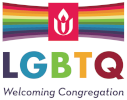Learn more about the UU religion, the principles and purposes of PUUC, our worship, Sunday School, and more...
Contents
- Unitarian Universalist Principles and Purposes
- Worship
- Religious Education for Children and Youth
- Religious Education for Adults
- Social Justice
- Fellowship
- Monadnock Summer Lyceum
- Administration
- Membership
- History and Architecture
Unitarian Universalist Principles and Purposes
The Peterborough Unitarian Church is affiliated with the Unitarian Universalist Association (UUA), which includes congregations in the United States and Canada. The UUA was formed in 1961 by the merger of two historic denominations, The American Unitarian Association founded by 1825 and The Universalist Church of America founded in 1793. In 1985, the UUA adopted a new Statement of Principles and Purposes, which follow.
We, the member congregations of the Unitarian Universalist Association, covenant to affirm and promote:
- The inherent worth and dignity of every person
- Justice, equity and compassion in human relations
- Acceptance of one another and encouragement to spiritual growth in our congregations
- A free and responsible search for truth and meaning
- The right of conscience and the use of the democratic process within our congregations and in society at large
- The goal of world community with peace, liberty, and justice for all
- Respect for the interdependent web of all existence of which we are a part
The living tradition we share draws from many sources:
- Direct experience of that transcending mystery and wonder, affirmed in all cultures, which moves us to a renewal of the spirit and an openness to the forces which create and uphold life
- Words and deeds of prophetic women and men which challenge us to confront powers and structures of evil with justice, compassion, and the transforming power of love
- Wisdom from the world's religions which inspires us in our ethical and spiritual life
- Jewish and Christian teachings which call us to respond to God's love by loving our neighbors as our ourselves
- Humanist teachings which counsel us to heed the guidance of reason and the results of science, and warn us against idolatries of the mind and spirit
- Spiritual teaching of Earth-centered traditions which celebrate the sacred circle of life and instruct us to live in harmony with the rhythms of nature
- Grateful for the religious pluralism which enriches and ennobles our faith, we are inspired to deepen our understanding and expand our vision. As free congregations, we enter into this covenant promising to one another our mutual trust and support.
Worship
Services are held at 10:15 am every Sunday from the first Sunday after Labor Day to the third Sunday in June. Our general worship style reflects our liberal Judeo/Christian heritage through readings, music, communal singing and sermon. However, services often vary in format and cover a wide range of themes. Festivals and Holy Days from Christianity and the world's other major faith traditions are celebrated, and the insights of modern science and philosophy fully incorporated.
In our worship, we do not seek to use life to prove the truth or meaning of any one religious tradition; rather, in our desire to make life true and meaningful, we use all religious and philosophical traditions as appropriate in our worship.
top
Religious Education for Children and Youth
The co-operative Sunday School program meets throughout the church year, with classes from nursery through high school. Usually the children participate in the first twenty minutes of the worship service, then proceed to their classroom for their own activities. A professional Director of Religious Education supervises the program in conjunction with an active committee of laypeople. Parents and other congegants share in responsibilities for teaching the classes.
The ethos of our Sunday School program is, in the words of the famous nineteenth century Unitarian William Ellery Channing, ". . . not to stamp our minds upon the young, but to stir up their own; not to make them see with our eyes but to look inquiringly and steadily with their own; not to form an outward regularity but to touch inward springs; not to burden memory but to quicken the power of thought, so that they may learn and approve for themselves what is everlastingly right and good."
top
Religious Education for Adults
We sponsor a broad range of programs for adults led by the Minister or a qualified layperson. The program often consists of a course of study over a period of weeks, discussions on a variety of issues, or invited speakers.
top
Social Justice
This congregation shares in the longstanding Unitarian Universalist tradition of active involvement in issues of social justice as an integral expression of religious life. Many members work individually, and the congregation works collectively, on social justice issues. This work takes many forms: self-education, political lobbying and advocacy, fund-raising and direct personal involvement.
top
Fellowship
The congregation is comprised of diverse groups and has a busy program designed to foster community. These include programs for special groups and interests such as the Women's Alliance, the Young Families' Group, Choir, and the Play Reading Group and all-congregation intergenerational programs such as the Winter Picnic, May Day celebration, Harvest Dinner and regular shared Potluck Dinners.
Through pastoral care and practical support, we also care for each other in times of particular need and crisis.
top
Monadnock Summer Lyceum
Since 1970 the church has sponsored the Monadnock Summer Lyceum, a widely appreciated series of lectures covering a broad range of issues given by invited speakers of distinction. This is a revival of the original Lyceum, the first in New Hampshire, that was begun in the mid-nineteenth century and also hosted by this church.
top
Administration
The congregation is autonomous and is the ultimate decision-making authority, with elected officers and Standing Committee responsible for the management of the church's affairs. Elected Trustees manage the church's endowment. Other committees are appointed for particular aspects of church life such as Worship, Religious Education, Social Justice, Property and Caring.
The Church Office is located in Carll House, 12 Summer Street, Peterborough (down the driveway at the rear of the church). In addition to a full-time Minister, the congregation employs, part-time, a Director of Religious Education, a Director of Music, an Organist, an Administrator and a Custodian.
top
Membership
Membership is open to anyone sympathetic to the principles and purposes of the congregation. No creedal test is required of either Minister or member. Members are responsible for the life and vitality of the congregation, and accept the following expectations:
- participation in worship and other congregational events
- participation in supporting the congregation's finances according to personal ability
- participation in the continuing nurture of one's own faith
- participation in the work of social justice.
History and Architecture
The present meeting house was built in 1825, superseding two former and more modest meeting houses on Old Street Road. The exterior of the church is virtually unchanged, except for the addition in 1926 of the Parish Hall and in 1995 of the provisions for handicapped access outside as well as inside. The church was the work of local craftsmen and artisans who drew upon designs of Asher Benjamin, a leading exponent of the Bullfinch style. There have been changes in the interior from time to time. In 1898 the lectern and high pulpit with suspended sounding board replaced an original mahogany center pulpit and plain front wall which displayed figures of St. Peter and St. Paul. Most recently, the entire Religious Education space has been thoroughly renovated.
The present building is listed in the National Registry of Historic Places.
top


